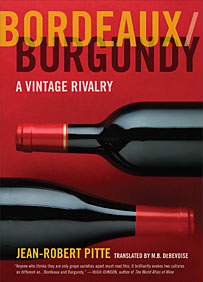To blend or not to blend... that is the question!
 I read a book recently - Bordeaux vs Burgundy, Vintage Rivalry. It got me thinking about wine blends.
I read a book recently - Bordeaux vs Burgundy, Vintage Rivalry. It got me thinking about wine blends.Ding ding ding... Ladies and Gentlemen!
In the red corner, we have Burgundy, Barolo, Hermitage, Vouvray, Mosel.
And in the blue corner - we have Bordeaux, Southern Rhone, and an army of Super Tuscans.
The wine world is divided. Mono-varietal and multi-varietals.
Every self-respecting wine region aims to produce flagship wines of great complexity. Complexity is the key word. The more different and non-straightforward aromas, flavors, textures, sensations a wine brings, the more interesting and enjoyable it is. Not to everyone, of course. In my opinion, as with most things in life, as we get older and more experienced, we evolve from simple to complex, we appreciate things that have more facets to them, more than what initially meets the eye, more...
Continue reading the rest of this article on corkd.com.



Comments
I'm hard pressed to agree with you that, as a rule, mono-varietal wines are more complex than blended wines. And I don't prefer one to the other. I think a factor you need to consider is that certain varietals lend themselves to blending, and others do not. Riesling and Pinot Noir are two grapes that are hardly ever successfully blended--they tend to be drowned out in combination with other varietals. They are also at one end of the spectrum in their transparency--in their ability to express the terroir of a given place more than virtually all other varietals. Some varietals, however, take to blending very well, and in combination with others add to the complexity of the overall mix. That's true of a lot of the varietals that can be used to make Chateauneuf du Pape, like Cinsaut and Counoise.
I think Jancis is on to something about the difference between cool and warm climates when it comes to the benefits of blending, but the characteristics of particular varietals are, I think, the bigger dynamic at play.
a couple reasons blends developed in certain regions were as an insurance policy against mother nature and grape suitability to certain soil types. cab s ripens last so in a cool year, merlot's earlier ripening, plush fruit and body are a welcome improvement to the blend. secondly, merlot is far more suitable to moisture retaining clay. cab s doesn't like "cold feet".
note - there is still some, albeit very little, of the interesting grape, carménère, planted in bordeaux, making six total permitted red varieties.
This is definitely a complex subject, with lots of side alleys I am tempted to diverge into. I am glad I brought up this topic, and thanks for your guys' comments. My supposition is that blending done successfully is not done for the sake of increasing complexity, but rather improving flavor profile (perhaps to match the local food?), the longevity of wine (as in adding Syrah and Mouvedre to CdPs), or as insurance, as Eric pointed out in Bordeaux. I suppose indirectly those actions impart complexity into wines too. I wonder if a wine-maker facing a choice to blend or not to blend will do so based on pursuit of complexity or balance? (Perhaps the latter?) I suppose blends also give wine-makers more tools to "craft" the wine they want. The more material they are permitted to work with (within the rules of an AOC, DOCG, or AVA) the more "insurance" they have, presumably, in making commercially viable wine. Which leads me to think that mono-varietals, although perhaps less work, are actually harder to make successfully.
Another intriguing comment was posted on corkd.com's version of this article - someone suggested that cheap wines tend to be better as blends, while mono-varietals tend to be more expensive.